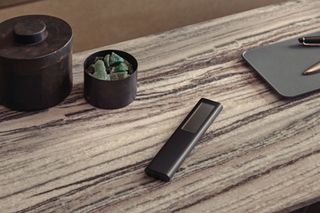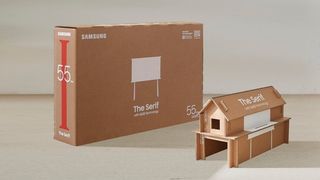Samsung's new QLED TVs show its commitment to sustainability

What you need to know
- Samsung is highlighting its new Eco Remote that includes solar cells and is made using recycled materials.
- Samsung's new QLED TVs offer creative ways to reuse the packaging as storage or home decor.
- Dezeen Magazine has partnered with Samsung on creative ways to reuse packaging.
While the bulk of the focus during CES 2021 is on the big, colorful displays, companies like Samsung continue to do their part by offering more sustainable ways to not only produce their products but also to reuse materials and packaging, as well as reduce the number of harmful materials they use that could end up creating more waste.
Samsung is highlighting its new Eco Remote Control (above), which was developed with sustainability in mind and comes included with each of Samsung's 4K and 8K TVs. Not only has Samsung implemented an energy-efficient circuit design within the remote, but it also included solar-powered batteries that can be recharged and used for up to two years. As far as the materials used to produce the remote, nearly a third of the plastic used is made from recycled material.

Even the packaging for Samsung's TVs is made to be sustainable and eco-friendly. By partnering with Dezeen Magazine, Samsung has developed creative ways to reuse your TV packaging around the house, from household storage to kids' toys. And it's easy to find ways to reuse the packaging, simply by scanning the QR code on the packaging. According to Samsung, this can "upcycle up to 200,000 tons of boxes a year and turn them into pieces of home decor."
It's great to see Samsung putting an emphasis on its sustainable business practices. As Jeramy Johnson noted towards the year's end, Samsung has not slouched when it came to its eco-friendly approach and has adopted an Eco-design Process as far back as 2004, which analyzes the environmental impact that its products may have, and thus trying to find ways to reduce that impact. Many of the best Samsung phones use as much as 37% of bioplastics in their components. "Samsung Electronics gives the utmost priority to the environment -- from the moment product planning begins until a product's final disposal."
Moves like this are great, but Samsung could always stand to take things a step further and position itself as a leader and influence other companies to follow suit. And of course, this would even include going so far as to no longer provide charging adapters with new smartphones, which we expect will be the case with Samsung's upcoming Galaxy S21 series.
So far, it really seems like Samsung is doubling down on its sustainability approach, but we'll have to see how the rest of the year plays out.
Be an expert in 5 minutes
Get the latest news from Android Central, your trusted companion in the world of Android

Derrek is a long-time Nokia and LG fanboy who loves astronomy, videography, and sci-fi movies. When he's not working, he's most likely working out or smoldering at the camera.
